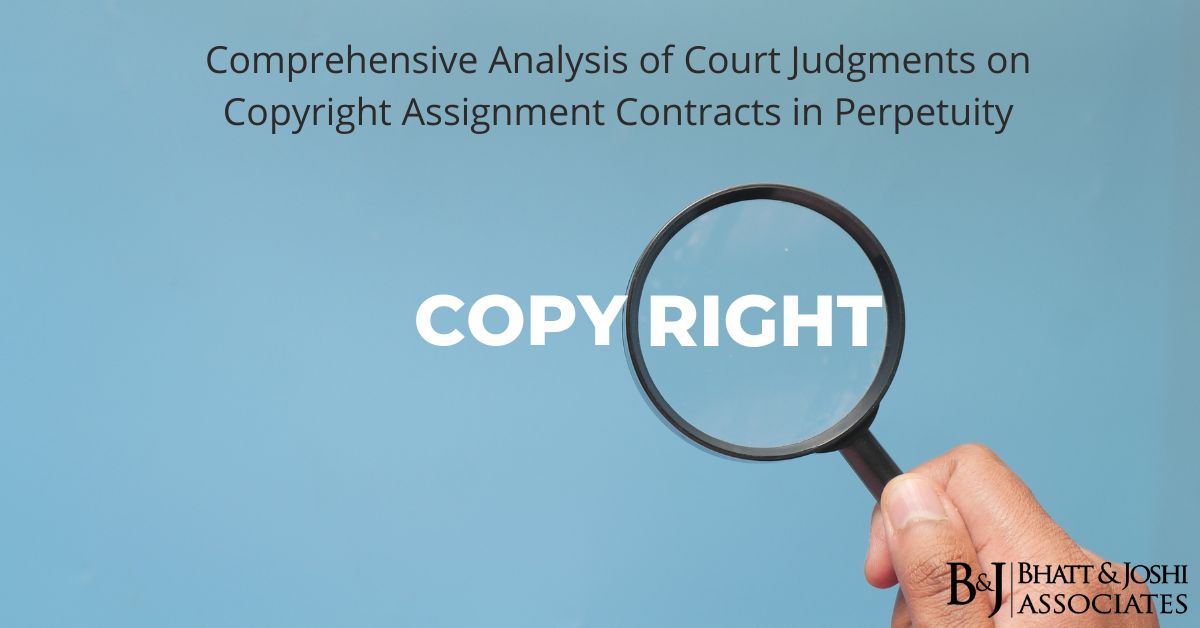Introduction: Understanding Copyright Assignment Contracts
Copyright assignment contracts are essential legal instruments that govern the transfer of copyright ownership from one party to another. These contracts delineate the rights and obligations of the parties involved, including the assignor (the original copyright owner) and the assignee (the recipient of the copyright). In the context of perpetuity, copyright assignment contracts aim to establish indefinite ownership of the copyright, granting the assignee exclusive rights to use, reproduce, distribute, and monetize the copyrighted work.
Legal Framework: Section 19(5) of the Copyright Act, 1957
Section 19(5) of the Copyright Act, 1957, serves as a foundational provision governing the duration of copyright assignment contracts. It states that in the absence of a specified duration in the agreement, the assignment shall last for five years. This provision aims to prevent perpetual assignments by imposing a default time limit on copyright transfers. However, courts have interpreted this provision in various ways, considering the intention of the parties and the language used in the contract.
Insights from Court Judgments:
-
Dorling Kindersley (India) Pvt. Ltd. Vs. Sanguine Technical Publishers and Ors. (2013):
The Delhi High Court’s ruling in this case emphasized the importance of interpreting copyright assignment agreements judiciously. The court highlighted that the absence of a specified term in the agreement does not automatically imply a default duration of five years. Instead, it stressed the need to analyze the agreement comprehensively to discern the true intentions of the parties.
-
Shemaroo Entertainment Ltd. Vs. Amrit Sharma and Ors. (2012):
In this case, the Delhi High Court underscored the significance of the language used in the contract to determine the intended duration of the assignment. Expressions such as “absolutely” and “worldwide” indicated a permanent arrangement, suggesting an assignment in perpetuity. The court emphasized the need to examine all clauses of the contract to discern the parties’ true intentions accurately.
-
Ilaiyaraja Vs. B. Narsimhasn and Ors. (2015):
The Madras High Court clarified that receiving royalty beyond the default five-year period does not validate an assignment if the agreement is not properly executed. The court stressed the importance of written and signed assignment agreements for enforceability, highlighting that subsequent actions such as receiving royalties do not ratify an invalid assignment.
-
Saregama Ltd. Vs. The New Digital Media and Ors. (2017):
The Calcutta High Court addressed the misconception that the absence of a specified duration implies absolute assignment. It emphasized that an assignment may be limited both in content and period, and the intention of the parties must be gathered from the agreement as a whole. Expressions like “full rights” indicate a permanent arrangement, while the absence of a specified term does not imply unlimited duration.
Analysis and Interpretation:
-
Intention of the Parties in Copyright Assignment Contracts:
Courts have consistently highlighted the importance of discerning the true intentions of the parties when interpreting copyright assignment contracts. While Section 19(5) provides a default duration, it is crucial to examine the entire agreement comprehensively to ascertain whether the parties intended a perpetual assignment.
-
Language Used in the Contract:
The language used in the contract plays a pivotal role in determining the intended duration of the assignment. Expressions such as “absolutely” and “worldwide” indicate a permanent arrangement, suggesting an assignment in perpetuity. Courts have stressed the need to analyze all clauses of the contract to accurately ascertain the parties’ intentions.
-
Enforceability of Assignment Agreements:
Court judgments have reiterated the importance of written and signed assignment agreements for enforceability. Merely receiving royalties beyond the default five-year period does not validate an assignment if the agreement is not properly executed. Parties must ensure clarity and precision in drafting assignment contracts to avoid ambiguity and disputes.
Implications for Copyright Owners and Assignees:
-
Clarity and Precision:
Copyright owners and assignees must ensure clarity and precision in drafting assignment contracts to avoid ambiguity and disputes regarding the duration of the assignment. Expressions such as “absolutely” and “worldwide” should be used judiciously to reflect the intended scope and duration of the assignment accurately.
-
Comprehensive Analysis of Copyright Assignment Contracts:
Parties involved in copyright assignment contracts should conduct a comprehensive analysis of the entire agreement, taking into account all clauses and provisions. This holistic approach enables a more accurate interpretation of the parties’ intentions regarding the duration of the assignment.
-
Legal Counsel and Expertise for Copyright Assignment Contracts
Seeking legal counsel and expertise is essential for drafting and interpreting copyright assignment contracts effectively. Legal professionals can provide valuable insights and guidance to ensure that the terms of the agreement align with the parties’ intentions and comply with relevant legal requirements.
Conclusion: Ensuring Fairness and Equity in Copyright Assignment Contracts
In conclusion, court judgments on copyright assignment contracts in perpetuity underscore the importance of clarity, precision, and comprehensive analysis. While Section 19(5) of the Copyright Act provides a default duration, courts have emphasized the need to interpret assignment agreements judiciously, considering the intention of the parties and the language used in the contract. Copyright owners and assignees must ensure clarity and precision in drafting assignment contracts to avoid ambiguity and disputes. Seeking legal counsel and expertise is crucial for navigating the complexities of copyright law and ensuring fair and equitable arrangements for all parties involved.














